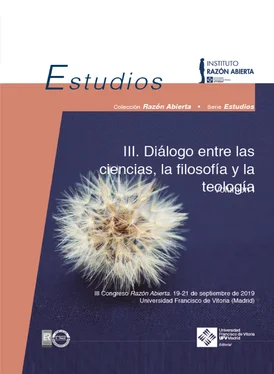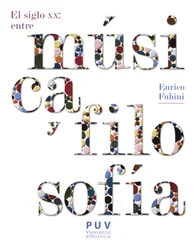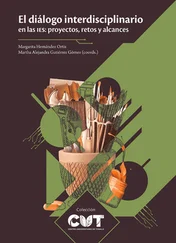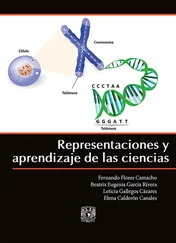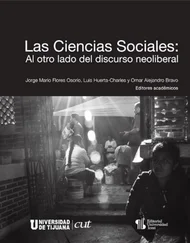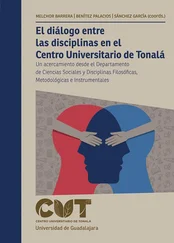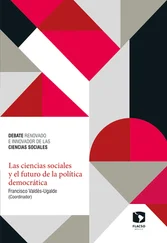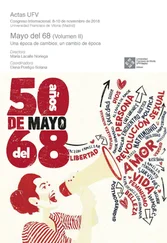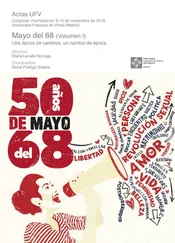María Lacalle - III Diálogo entre las ciencias, la filosofía y la teología. Volumen I
Здесь есть возможность читать онлайн «María Lacalle - III Diálogo entre las ciencias, la filosofía y la teología. Volumen I» — ознакомительный отрывок электронной книги совершенно бесплатно, а после прочтения отрывка купить полную версию. В некоторых случаях можно слушать аудио, скачать через торрент в формате fb2 и присутствует краткое содержание. Жанр: unrecognised, на испанском языке. Описание произведения, (предисловие) а так же отзывы посетителей доступны на портале библиотеки ЛибКат.
- Название:III Diálogo entre las ciencias, la filosofía y la teología. Volumen I
- Автор:
- Жанр:
- Год:неизвестен
- ISBN:нет данных
- Рейтинг книги:5 / 5. Голосов: 1
-
Избранное:Добавить в избранное
- Отзывы:
-
Ваша оценка:
- 100
- 1
- 2
- 3
- 4
- 5
III Diálogo entre las ciencias, la filosofía y la teología. Volumen I: краткое содержание, описание и аннотация
Предлагаем к чтению аннотацию, описание, краткое содержание или предисловие (зависит от того, что написал сам автор книги «III Diálogo entre las ciencias, la filosofía y la teología. Volumen I»). Если вы не нашли необходимую информацию о книге — напишите в комментариях, мы постараемся отыскать её.
III Diálogo entre las ciencias, la filosofía y la teología. Volumen I — читать онлайн ознакомительный отрывок
Ниже представлен текст книги, разбитый по страницам. Система сохранения места последней прочитанной страницы, позволяет с удобством читать онлайн бесплатно книгу «III Diálogo entre las ciencias, la filosofía y la teología. Volumen I», без необходимости каждый раз заново искать на чём Вы остановились. Поставьте закладку, и сможете в любой момент перейти на страницу, на которой закончили чтение.
Интервал:
Закладка:
Los participantes en el Congreso pudieron disfrutar también de la ponencia de Stefano Zamagni, profesor de Economía en la Universidad de Bolonia y presidente de la Pontificia Academia de las Ciencias Sociales. El tema que este abordó fue el de la desigualdad social en el mundo de la revolución digital. El punto de partida es una doble premisa: se constata el hecho actual-histórico de la revolución tecnológica y digital y, a la vez, la existencia de la desigualdad económica y social en el mundo. El profesor Zamagni explicó en su ponencia las causas que explican que ambos fenómenos avancen de la mano (especialmente las sociopolíticas) y propuso varias iniciativas para revertir la situación.
El profesor Denis Larrivée, de la International Association of Catholic Bioethicists, presentó una conferencia con el título «The Appeal to Techne: Myopia in Modern Neuroscience’s Anthropological Vision». En ella, analizó la fábula científica que considera que el hombre no es más que una máquina muy compleja y que, por lo tanto, la antropología debe reducirse a una consideración de tipo meramente biofísico. El discurso del profesor Larrivée se centra en el análisis de este mito, aplicado a los estudios de las neurociencias, para estudiar el empobrecimiento de la propuesta antropológica resultante. Esta mirada, en esencia mecanicista, no solo va en detrimento de la concepción del ser humano, sino que mina también las posibilidades de desarrollo científico de las propias neurociencias a la hora de explicar la unidad sustancial del ser humano.
La última de las ponencias la impartió el profesor Miquel-Àngel Serra, de la Universidad Pompeu Fabra, de Barcelona, y trató sobre el neuromejoramiento humano y la relación entre los conceptos de mente, cerebro y trascendencia. A partir de una descripción de la maravillosa complejidad del cerebro humano, el profesor Serra abogó por la necesidad de abordar la cuestión con una mirada amplia, teniendo en cuenta no solo la consideración biológica y científica, sino también la filosófica y sapiencial. Con el afán de superar cualquiera de las propuestas reduccionistas que se han hecho a lo largo de la historia, el profesor Serra analizó todas las posibles connotaciones de neuromejoramiento (desde el tratamiento farmacológico hasta las propuestas del transhumanismo) y concluyó con los graves problemas morales y antropológicos que pueden llegar a suponer dichas connotaciones si no dialogan con una forma de saber metacientífica más amplia, como la filosofía o la teología.
A estas ponencias se añaden las participaciones en el Congreso en forma de comunicaciones. Para esta edición, se han seleccionado aquellas propuestas que respondían con más claridad y acierto a los criterios planteados por la organización, a pesar de que la inmensa mayoría de ellas eran de gran calidad científica. En esta selección pueden encontrarse verdaderas joyas de diálogo de razón abierta entre todo tipo de saberes. Más allá de las conclusiones alcanzadas, de los méritos y los logros particulares de cada uno de estos trabajos, la mayor riqueza es, sin duda, la experiencia comunitaria de grandes profesores e investigadores, reunidos en la búsqueda de la verdad, del bien y del sentido de la existencia humana.
Por lo tanto, no queda más que agradecer a todos los que han intervenido en este proyecto y a quienes lo han hecho realidad. Esperamos que el alcance de la propuesta del Instituto Razón Abierta siga creciendo y estableciendo redes de contacto y de colaboración entre profesores e investigadores de todo el mundo.
1 Discurso de monseñor Federico Lombardi. Presentación Premios Razón Abierta en Madrid. Septiembre, 2016. El discurso íntegro puede encontrarse en: http://premiosrazonabierta.org/el-concepto-de-razon-abierta/(16 de julio de 2020).
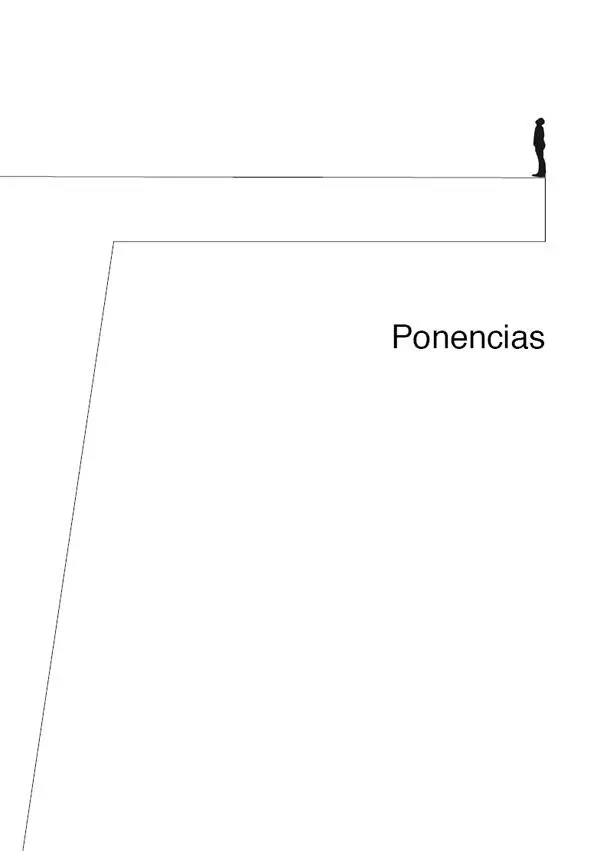
NATURALISM AND THE DISCIPLINES
Brad S. Gregory
University of Notre Dame (USA)
I want to begin by reflecting on the phrase that identifies the Expanded Reason Awards. «Expanded» compared to what? To what reason has been in the past, or should be in the present, or might be in the future? Or perhaps all three? If we can identify shortcomings in the governing assumptions pertaining to the implicitly «contracted reason» as it is employed in research universities, then perhaps we might see some paths forward for its expansion – and not simply for those of us who happen to prefer our reason expanded rather than constricted, but for anyone who wants to be guided by reason as such in the pursuit of truth. In that case, «expanded» reason would mean restoring to its exercise what ought not to have been restricted in the first place. It would mean a move toward repairing what has without reason been broken.
The Expanded Reason Awards website includes remarks by Monsignor Federico Lombardi on the «concept of expanded reason» prompted by Joseph Ratzinger, who long before becoming Pope Benedict XVI expressed concerns about the predominant intellectual culture of our time. 1 We lack a vision of knowledge as a whole, one that can integrate the ever more specialized findings of sub-fields within fields within disciplines, an overarching vision that seems elusive in proportion to the increase of our knowledge; despite our ever-increasing technological achievements, there is neither a shared recognition of the inherent dignity of the human person nor of the ethical imperatives closely connected to that dignity; and the most fundamental human questions, about values, purpose, and ultimate meaning, have been relegated to individual preferences that lie outside of reason understood in any normative or universal sense. Monsignor Lombardi notes the «[r]elativism, scientism, and pragmatism» of this intellectual culture, which characterizes universities today not only in Europe and North America but all around the world. I want to suggest that what underlies this intellectual culture and many of its problems is naturalism , regarded not simply as a methodological assumption in the natural sciences, but as a comprehensive worldview and a metaphysics.
This distinction between methodological assumption and metaphysical assertion is critical, yet frequently the two are conflated. One can scarcely fail to have enormous respect for the natural sciences per se and for their astonishing, ever-expanding capacities for exploring and explaining reality at every scale, from the subatomic to the cosmological, according to their respective methods and assumptions. 2 Naturalism is a methodological assumption shared by all of the natural sciences, and quite properly so: it means, for the purposes of scientific explanation, regarding the universe as a whole and everything in it as if it were a closed system of nothing but and nothing more than matter-energy explicable through the mechanistic, efficient causality of natural forces. By definition and as a stipulation for doing science, no reference to anything supernatural or transcendent is permissible, nor is reference allowed to any intention, meaning, value, or purpose. The results have been remarkable since methodological naturalism was pioneered in seventeenth-century mechanics, was extended to nineteenth-century biology through Darwinism, and in the last century has been further applied in so many disciplines, including post-Newtonian physics, cosmology, genetics, and neuroscience. Provided the sciences remain within their stipulated self-limitations, including naturalism as a methodological assumption, they are constantly adding to our knowledge of reality. No problem; quite the contrary.
The problem is rather that the exponential increase in scientific knowledge has been taken by some as a warrant to inflate its methodological postulate of naturalism into a metaphysical assertion. Naturalism has been made into a comprehensive claim about reality as such, a worldview that now constitutes part of the de facto framework of our prevailing intellectual culture and of all academic disciplines in universities. When a methodologically provisional «as if» becomes a metaphysically assertive «is» naturalism almost always functions essentially as a synonym for materialism and atheism. Its self-consciously abstractive, reductionist explanatory method shifts from the proper recognition that questions about transcendence, meaning, purpose, and values are simply not part of its intellectual enterprise, to the unwarranted insistence that, its methods having failed to find anything transcendent or any inherent meaning in reality, none exists. (This is bizarre, to say the least – of course none of the natural sciences have discovered what they are prohibited from even considering, as a corollary of their own self-constitutive methodological mandate.) Relatedly, the expanding explanatory power of the natural sciences is wedded to a constantly repeated historical narrative about a seismic, modernizing shift from pre-scientific ignorance, superstition, and religious credulity to enlightened knowledge, observation, and secular rationality. The narrative seems to gain further traction from wider processes of secularization, themselves influenced by consumerist practices that erode the familial relationships and other social solidarities traditionally anchored in communities of faith, practices that depend on the application of technologies in industrial manufacturing that are in turn based on burgeoning scientific knowledge. As Pope Francis tersely put it in Laudato si’ , «everything is connected.» 3 More apparent confirmation for metaphysical naturalism, at least culturally and institutionally, comes from the dominance of the STEM disciplines in universities all around the world: they attract the big government and corporate money bestowed as investments in the hope that new knowledge can be turned into patentable, lucrative technologies.
Читать дальшеИнтервал:
Закладка:
Похожие книги на «III Diálogo entre las ciencias, la filosofía y la teología. Volumen I»
Представляем Вашему вниманию похожие книги на «III Diálogo entre las ciencias, la filosofía y la teología. Volumen I» списком для выбора. Мы отобрали схожую по названию и смыслу литературу в надежде предоставить читателям больше вариантов отыскать новые, интересные, ещё непрочитанные произведения.
Обсуждение, отзывы о книге «III Diálogo entre las ciencias, la filosofía y la teología. Volumen I» и просто собственные мнения читателей. Оставьте ваши комментарии, напишите, что Вы думаете о произведении, его смысле или главных героях. Укажите что конкретно понравилось, а что нет, и почему Вы так считаете.
